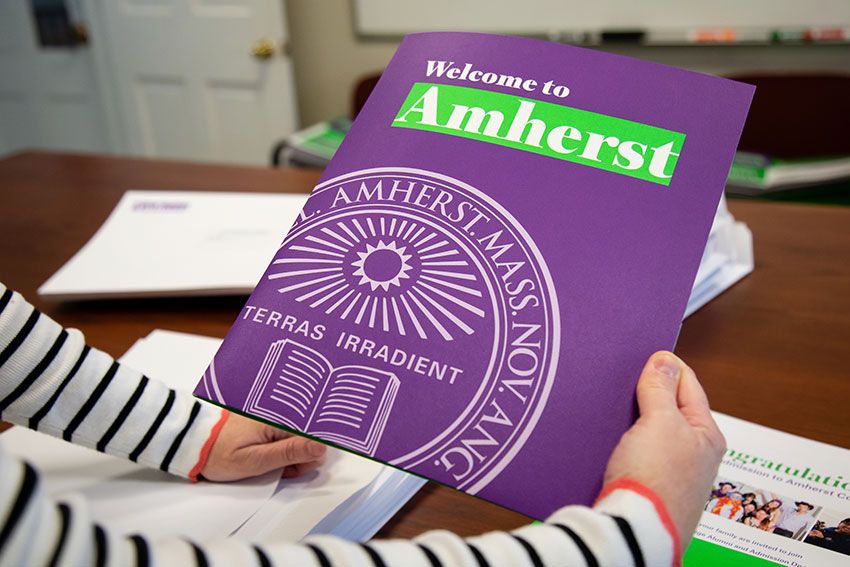FAFSA Troubles Delay Enrollment Decisions
Admitted members of the class of 2028 will have two extra weeks to make their enrollment decision, amid the troubled rollout of the new FAFSA form. The college has still been able to provide prospective students with estimated aid packages.

Recently admitted members of the class of 2028 will have until July 1 to apply for federal financial aid and until May 15 to make commitment decisions, two weeks later than normal. Amherst is among many colleges adapting to this year’s troubled rollout of the new Free Application for Federal Student Aid, or FAFSA, form.
The overhaul of the FAFSA form this year, which included a revision of the formula for need analysis, meant the form was unavailable for applicants and their families to fill out until Jan. 1, a large delay from the usual timeline of early October.
The delay in FAFSA availability has subsequently led to a delay in colleges like Amherst receiving financial aid information from the federal government. The college has yet to receive FAFSA information and might not until early April, according to Dean of Financial Aid Gail Holt.
It is because of this delay that Amherst has pushed back both its FAFSA submission deadline and decision date for incoming students.
Admitted students have still been able to receive estimated aid packages based on the information in their College Scholarship Service (CSS) profiles, which the college requires alongside the FAFSA for students seeking financial aid.
Emma Torres, an incoming first-year Amherst student who applied early decision, explained that Amherst’s use of the CSS profile allowed her to experience a smooth financial aid application process.
“Amherst has been really helpful in navigating the FAFSA-related challenges. After I was admitted, Amherst created an estimated financial aid package based on my CSS profile. This has allowed my family the comfort of knowing what we will be paying next year,” she said.
This year’s FAFSA overhaul was meant to simplify the process by reducing the number of questions that families have to answer and allowing families to give their consent for their income information to be transferred directly from the IRS to the Department of Education, meaning the FAFSA could reasonably be filled out in 10-15 minutes, Holt said.
Additionally, the FAFSA overhaul was designed to update and improve the need analysis and the assessment of how much families were expected to contribute toward college expenses, Holt added, meaning that more students can qualify for the Federal Pell Grant and some students who received the Grant may be eligible for more money.
However, the Department of Education faced difficulties in rolling out the system efficiently. Holt emphasized the enormity of the department’s task as the primary reason for the FAFSA delays.
“The tricky part about the process of rolling it out is that the systems really hadn’t been modified in 40 years,” she said. “So this year is a challenge for sure.”
Luckily, the college’s use of the CSS profile means that it has enough information to make aid offers on schedule this year, according to Holt.
She added that when the college begins to receive FAFSA data, it will review it and send aid revisions to students if necessary.
“It’s not uncommon for us to have to go through a revision process, but it’s going to be a bigger process this year for us,” Holt said.
Nick Torres ’25, Emma’s brother, works with the College For All program, a non-profit organization helping students navigate the college application process. He emphasized Amherst’s adept navigation of the unusual year. Torres has previously worked on the faculty committee for admission and financial aid.
“Amherst is really going above and beyond to make sure that students have an understanding of what they’re going to have to pay,” he said. “Whereas the vast majority of schools either don’t have the opportunity to even do that because they’re based solely on the FAFSA, or they’re just not making as concerted an effort,” he added.
Emma Torres also emphasized the struggle of some of her peers applying to colleges that rely solely on the FAFSA. “Many of my peers had been admitted to other schools that are simply making them wait until after the delays are resolved to get their financial aid packages. This has caused them much stress about college access and affordability. I’m super grateful that Amherst did not put me in that position,” she said.
While Holt acknowledged there is a national concern that high school students might be discouraged from applying for college because of the hiccups of this year’s process, she said she thought Amherst applicants and students are supported very well, noting that the number of applications received this year by Amherst was similar to past years.
Holt concluded by saying that this year’s FAFSA overhaul will ultimately be hugely beneficial, even if the rollout has been bumpy. “I think the most important message is that with anything new there can be hiccups,” she said. “Going forward and once all the systems are improved in the future, it should be a really simplified process. More money for students, and it should be a good thing.”





Comments ()